Why you can trust Tom's Hardware
Comparison Products
Today, we pit the Adata XPG Gammix S11 Pro against a bunch of competing high-end drives. This includes its near-identical twins, the Adata XPG SX8200 Pro and Mushkin Pilot-E, the Samsung 970 EVO Plus and 970 PRO, WD Black SN750, as well as the more affordable Corsair Force MP510 and Intel SSD 660p. On top of this, we added in the super expensive Intel Optane SSD 905p in addition to some more budget-sensible options such as Crucial’s SATA-based https://www.tomshardware.com/reviews/intel-optane-ssd-905p,5600.html and a WD Black HDD for good measure.
Game Scene Loading - Final Fantasy XIV
The Final Fantasy XIV StormBlood benchmark is a free real-world game benchmark that easily and accurately compares game load times without the inaccuracy of using a stopwatch.
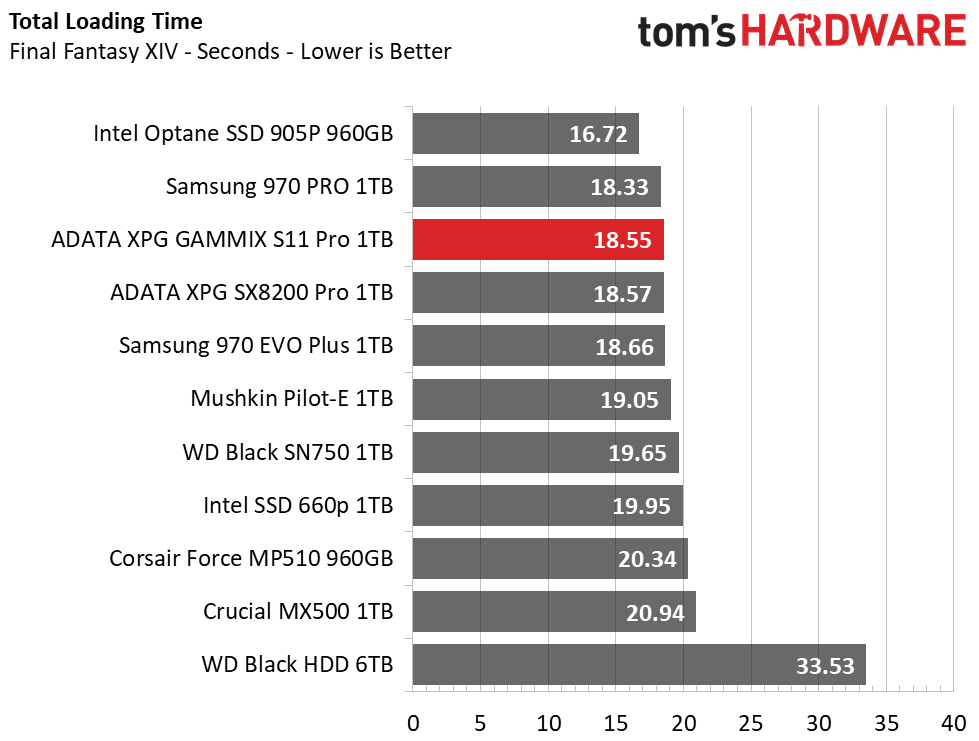
For those who prioritize fast game load times, the S11 Pro achieved a very fast time on this test. Intel’s Optane 905p takes first place and the Samsung 970 Pro took second, but the Adata S11 Pro’s fastest total load time of 18.55 seconds, outperformed the SX8200 Pro by a fraction of a second and got it third place overall.
Transfer Rates – DiskBench
We use the DiskBench storage benchmarking tool to test file transfer performance with our own custom 50GB block of data. Our data set includes 31,227 files of various types, like pictures, PDFs, and videos. We copy the files to a new folder and then follow up with a reading test of a newly-written 6.5 GB file.
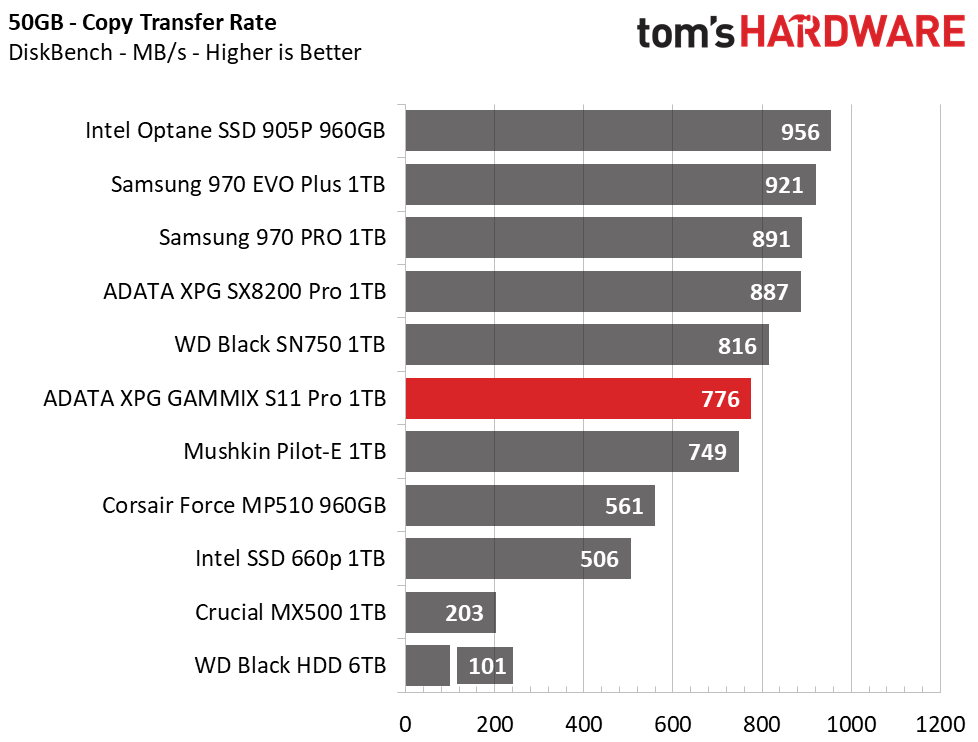
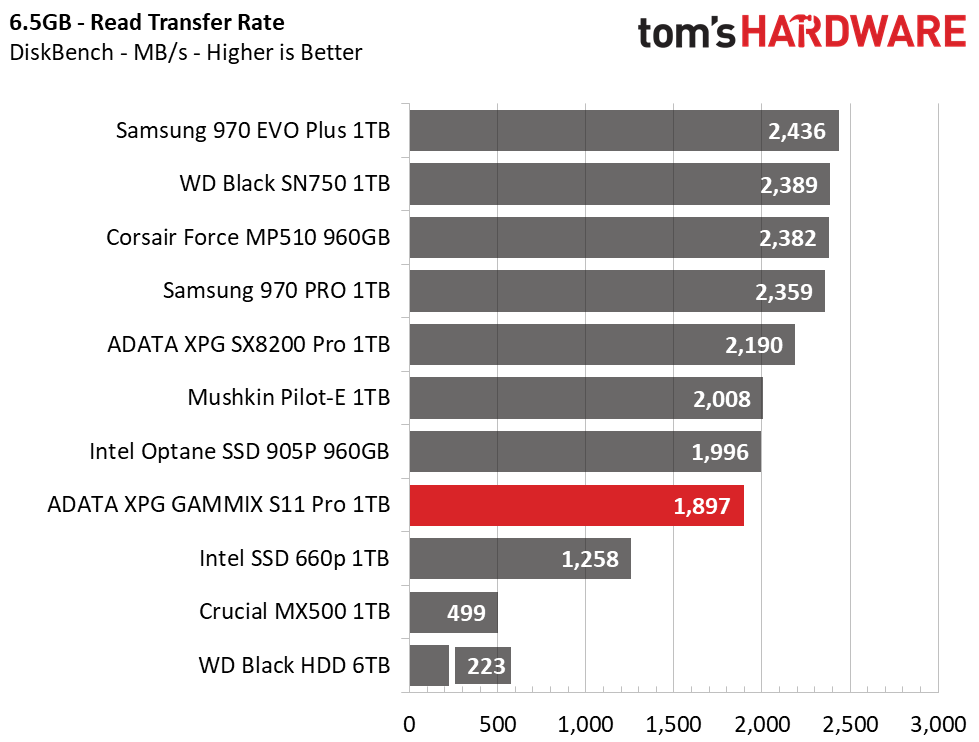
In contrast to its game loading results, Adata’s S11 Pro copied the 50GB test folder at a rate of about 100 MBps slower than the SX8200 Pro. But the Mushkin Pilot drive trails by another 27 MBps. This ranks the S11 Pro sixth overall in copy performance.
Large file read performance is also slower. Instead of reading at about 2.2 GBps like the SX8200 Pro or 2 GBps like the Pilot-E, the S11 Pro read the 6.5GB test file at 1.9GB/s. This ranks it eighth overall, though it still outperforms the Intel SSD 660p, MX500, and the WD Black HDD significantly.
Trace Testing – PCMark 8 Storage Test 2.0
PCMark 8 is a trace-based benchmark that uses Microsoft Office, Adobe Creative Suite, World of Warcraft, and Battlefield 3 to measure the performance of storage devices in real-world scenarios.
Get Tom's Hardware's best news and in-depth reviews, straight to your inbox.
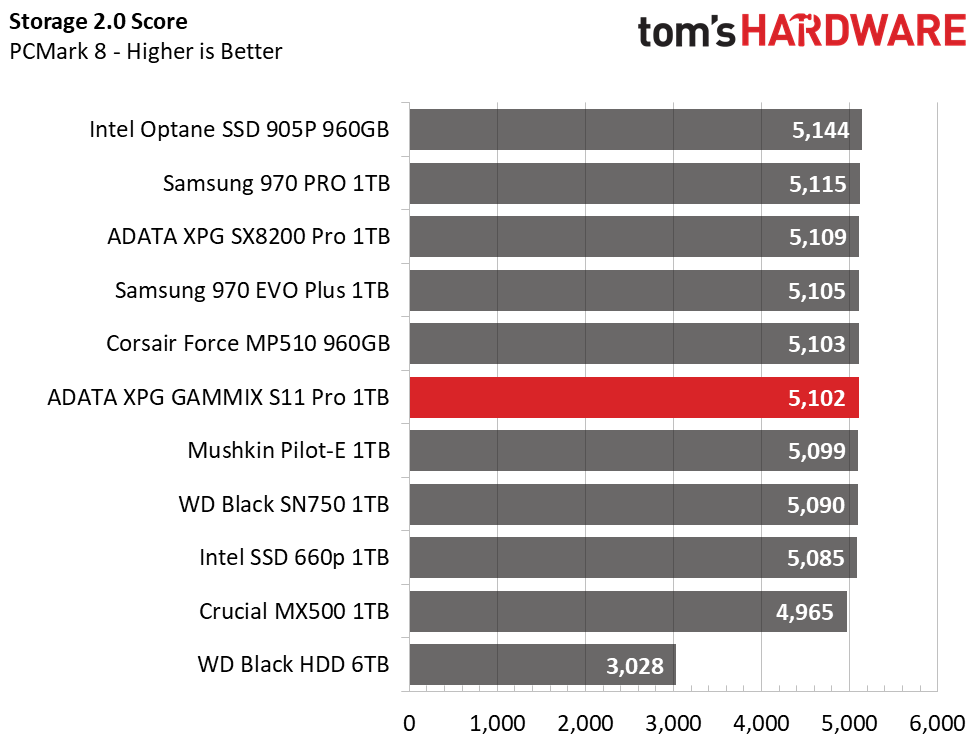
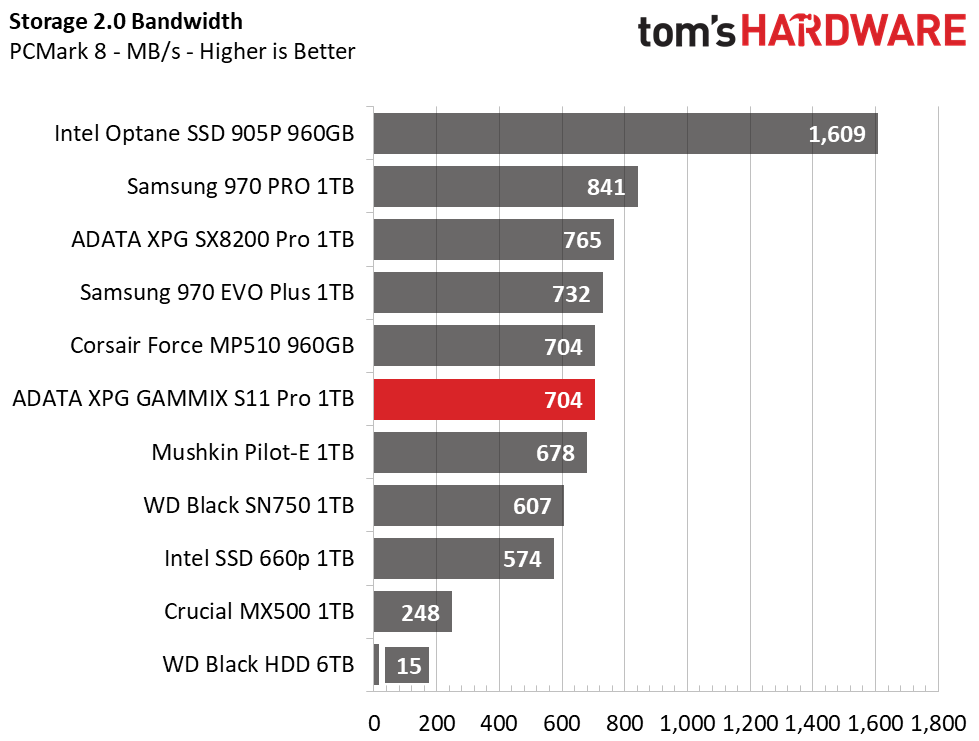
It seems that the SX8200 Pro has some faster-performing firmware than that of the S11 Pro. But overall, the S11 Pro is still a high-ranking drive. The S11 Pro scored sixth place and ties the Corsair Force MP510. It outperformed the Pilot-E and WD Black SN750 this time, is almost three times faster than the MX500, and absolutely destroys the HDD’s performance.
SYSmark 2014 SE
Like PCMark, SYSmark uses real applications to measure system performance. SYSmark takes things much further, however. It utilizes fourteen different applications to run real workloads with real data sets to measure how overall system performance impacts the user experience. BAPCo's SYSmark 2014 SE installs a full suite of applications for its tests, which include Microsoft Office, Google Chrome, Corel WinZip, several Adobe software applications, and GIMP. That also makes it a great test to measure the amount of time it takes to install widely-used programs after you install a fresh operating system.
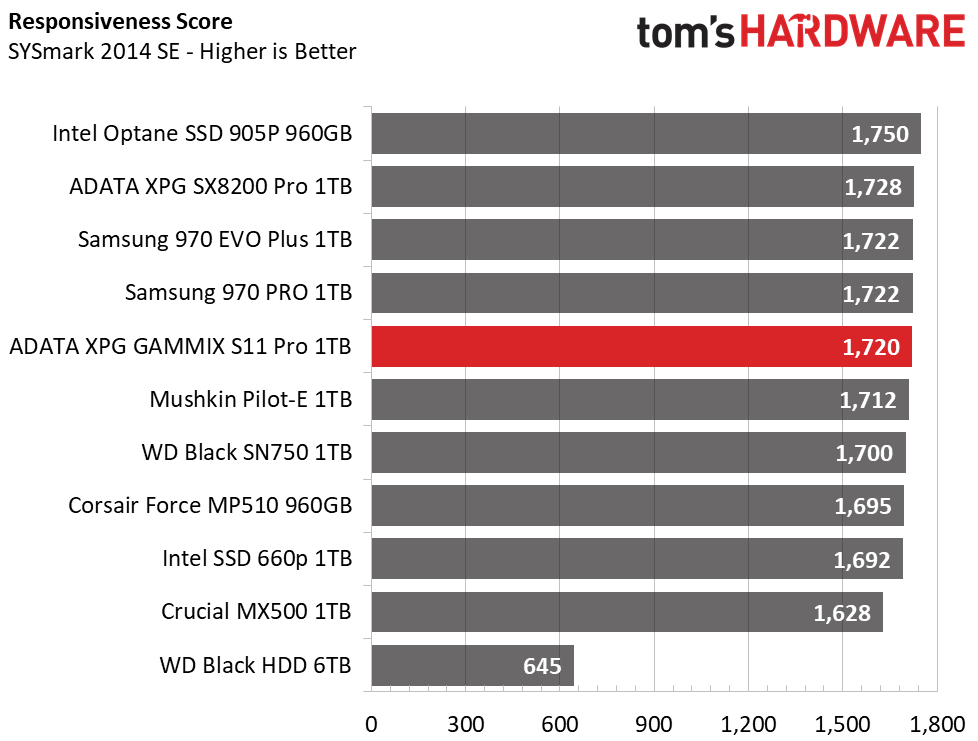
SYSmark reiterates what we have been seeing. The S11 Pro scores up there with the best, but the SX8200 Pro edges away ever so slightly with higher highs. The S11 Pro comes in fifth place overall, just points behind the Samsungs and ahead of the Pilot-E and WD Black SN750. And, compared to a standard HDD, it isn’t even a fair fight. You’re at a significant disadvantage with an HDD running your OS and applications.
Trace Testing – SPECworkstation 3
Like PCMark 8, SPECworkstation 3 is a trace-based benchmark, but it is designed to push the system harder by measuring workstation performance in professional applications. The full suite consists of more than 30 workloads, but we've opted to only run the storage benchmark which uses only 15 of them and categorizes the results into 5 market segments for scoring: Media & Entertainment, Product Development, Life Sciences, Energy, and General Operations.
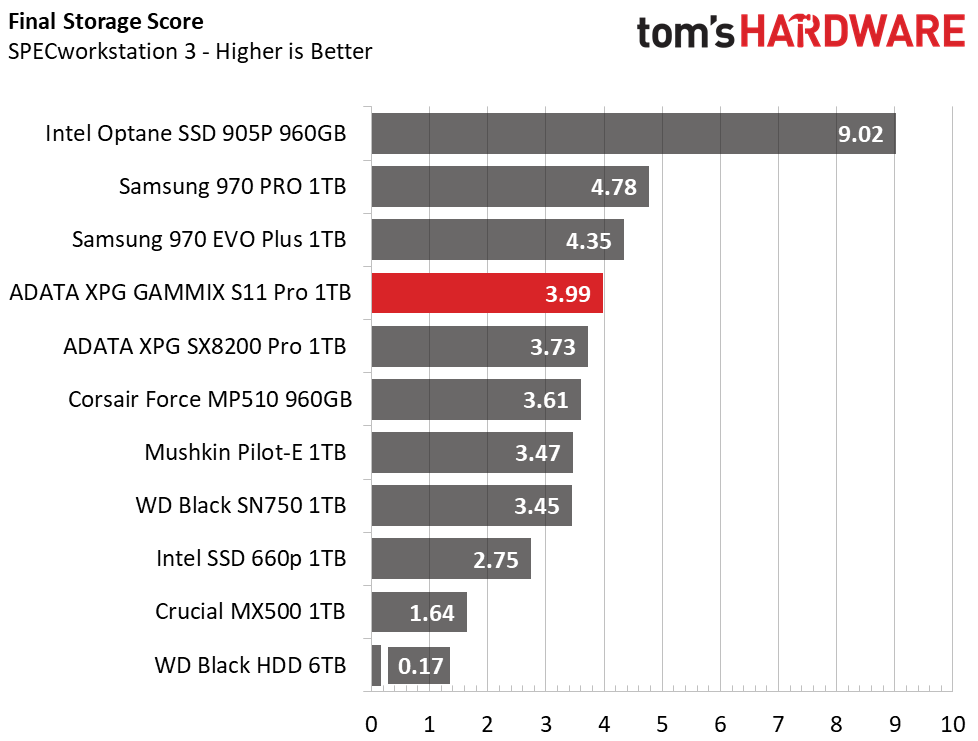
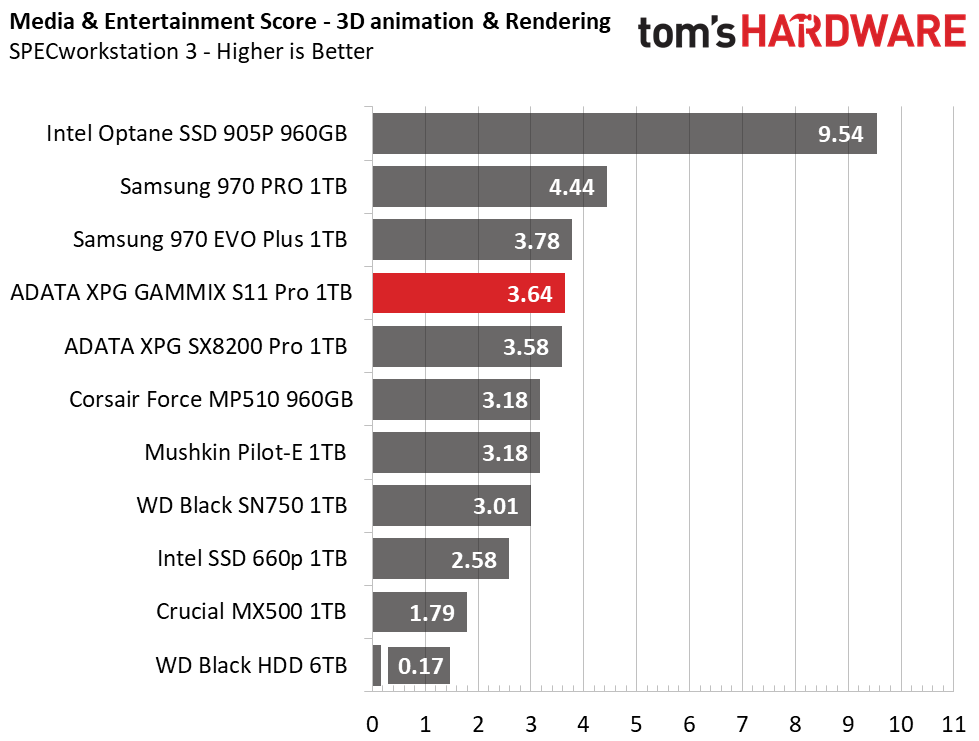
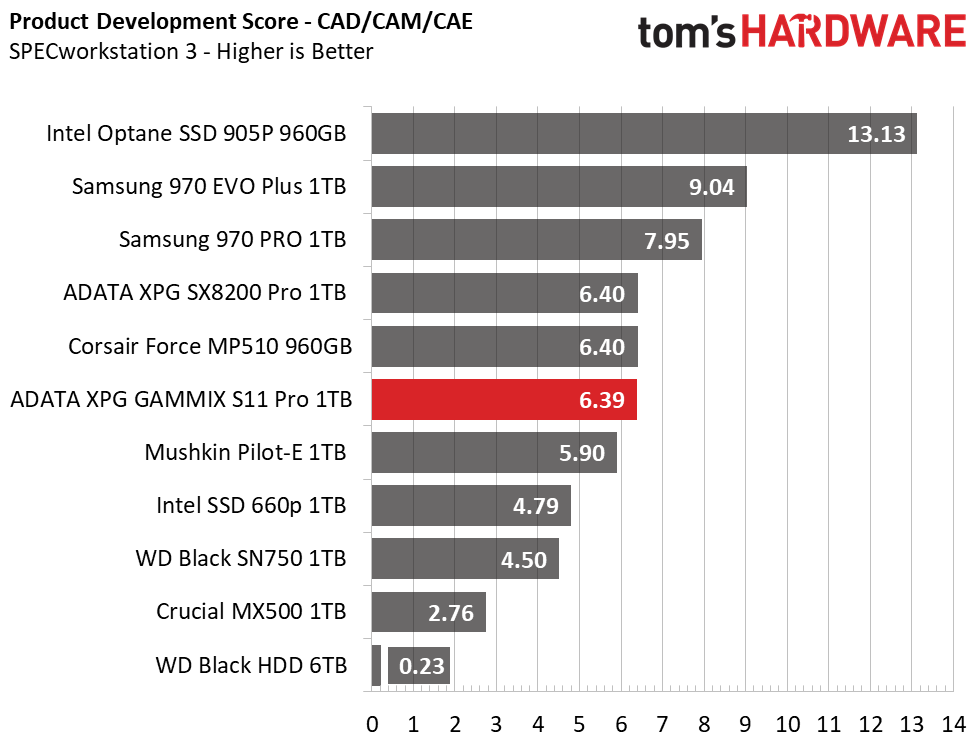
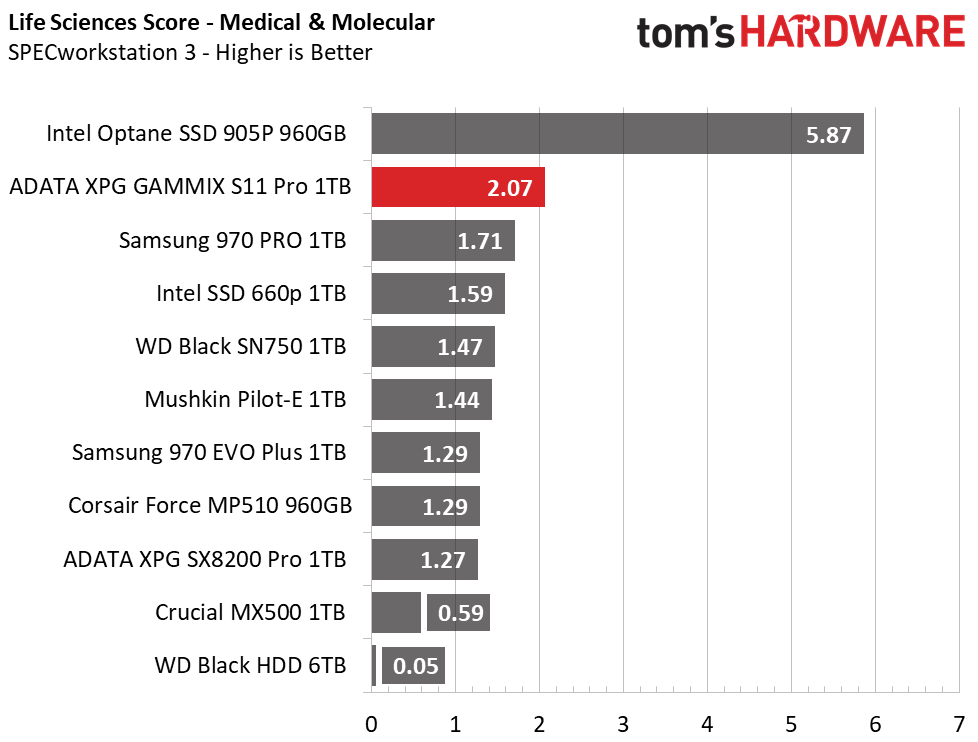
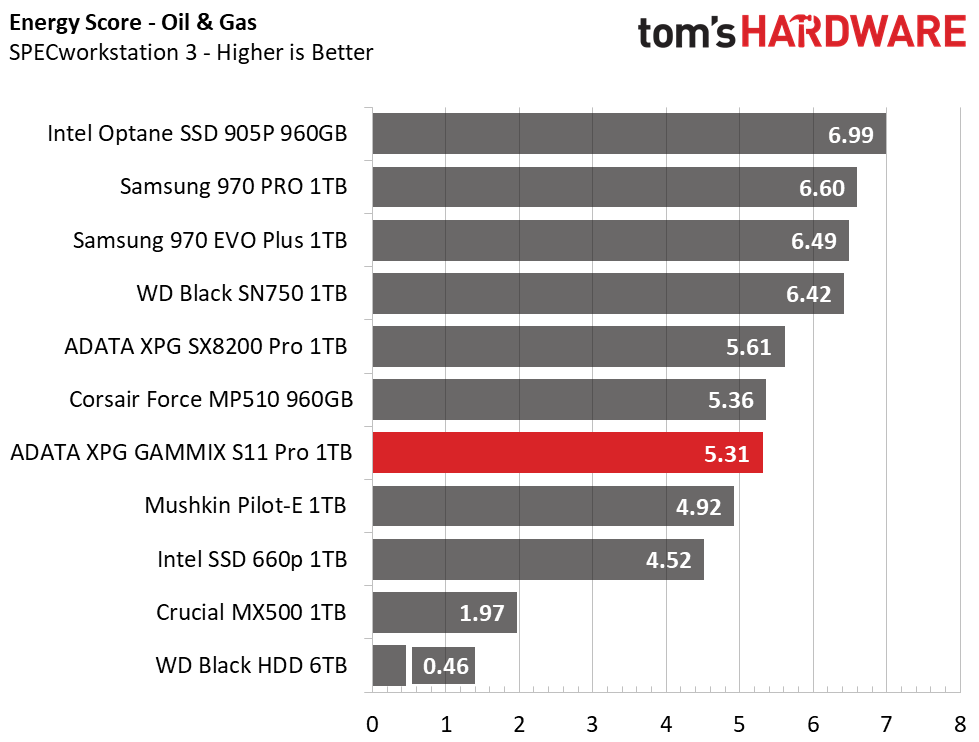
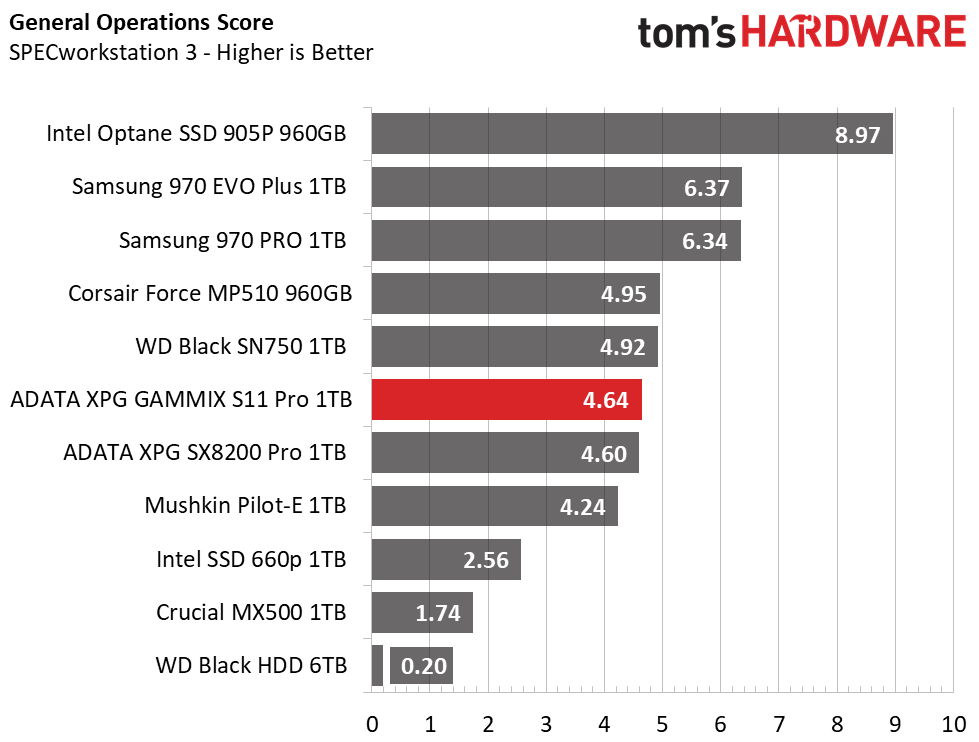
While testing with light workloads revolving around consumer-based use, the S11 Pro usually fell behind the SX8200 Pro ever so slightly. However, in SPECworkstation 3, we can see the opposite occurs. The S11 Pro lands fourth place here, just behind the Samsung 970s and far ahead of the Mushkin Pilot-E. It seems the S11 Pro can better withstand prosumer workloads and delivers more consistent performance.
Synthetic Testing - ATTO
ATTO is a simple and free application that SSD vendors commonly use to assign sequential performance specifications to their products. It also gives us insight into how the device handles different file sizes.
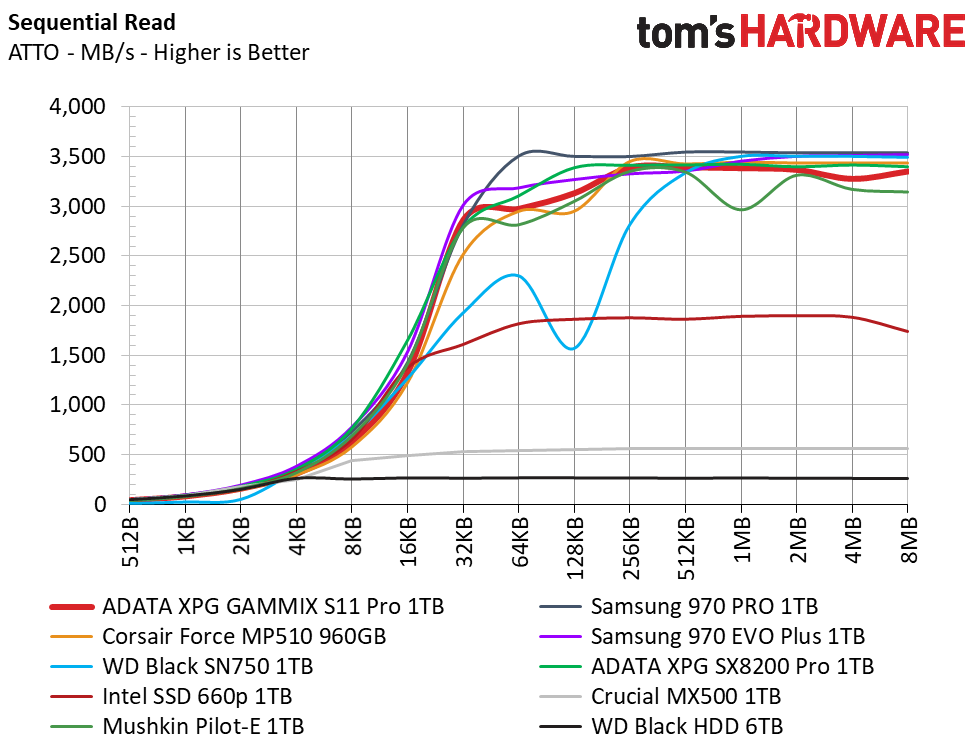
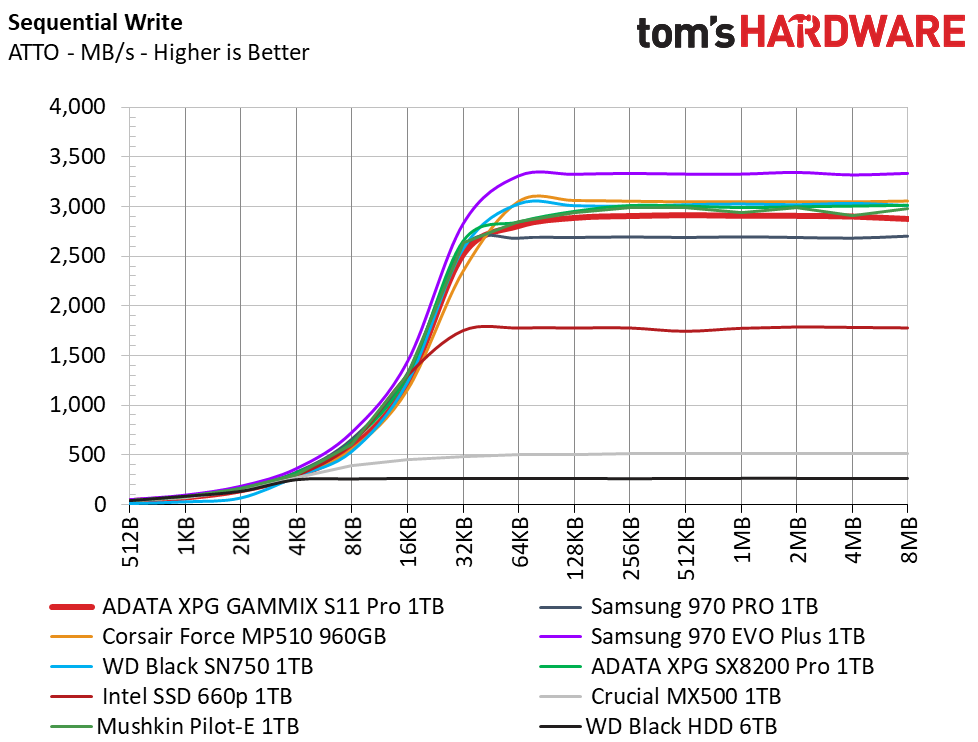
In ATTO the S11 Pro’s read performance was within a few MBps of the SX8200 Pro, and writes were a bit slower. Overall, the Adata S11 Pro hit about 3.4/2.9 GBps read/write speeds.
Synthetic Testing - iometer
iometer is an advanced and highly configurable storage benchmarking tool that vendors often use to measure the performance of their devices.
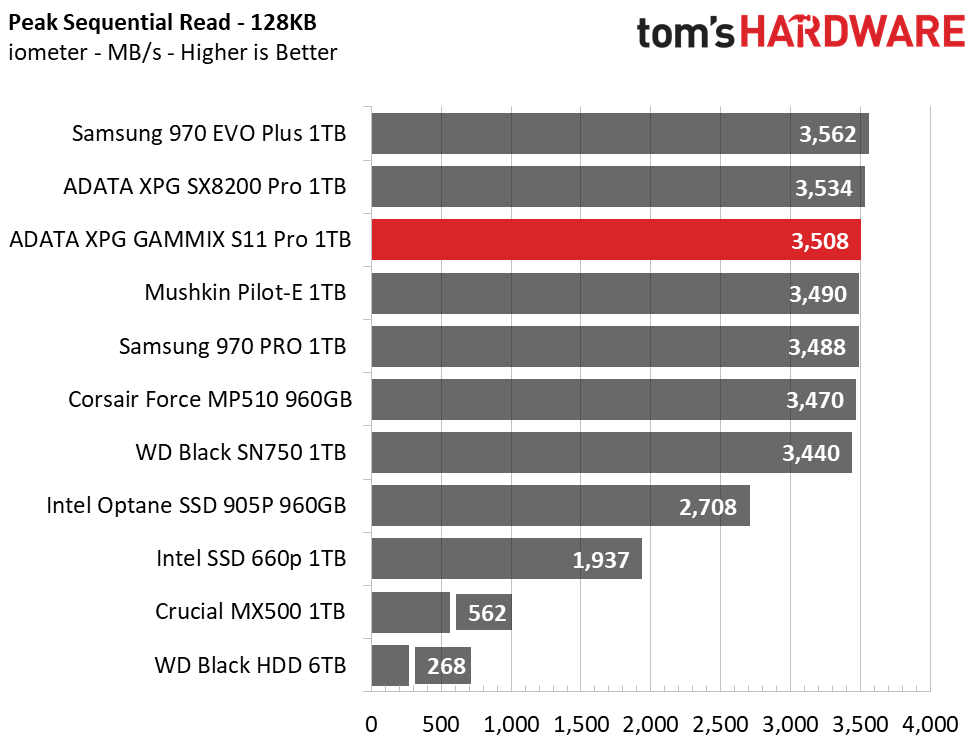
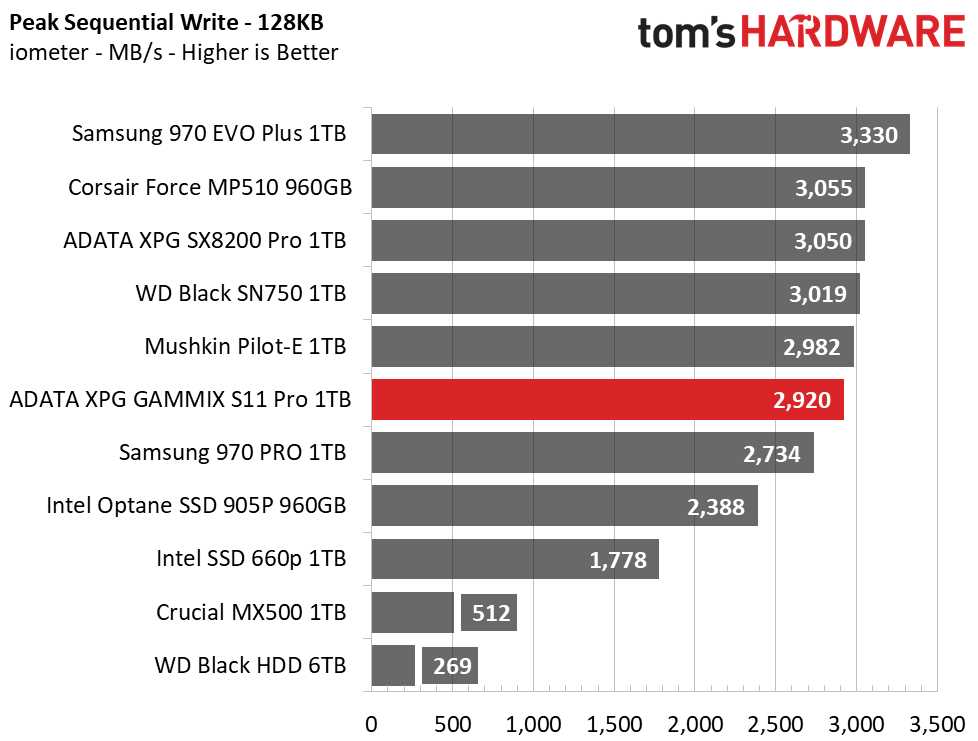
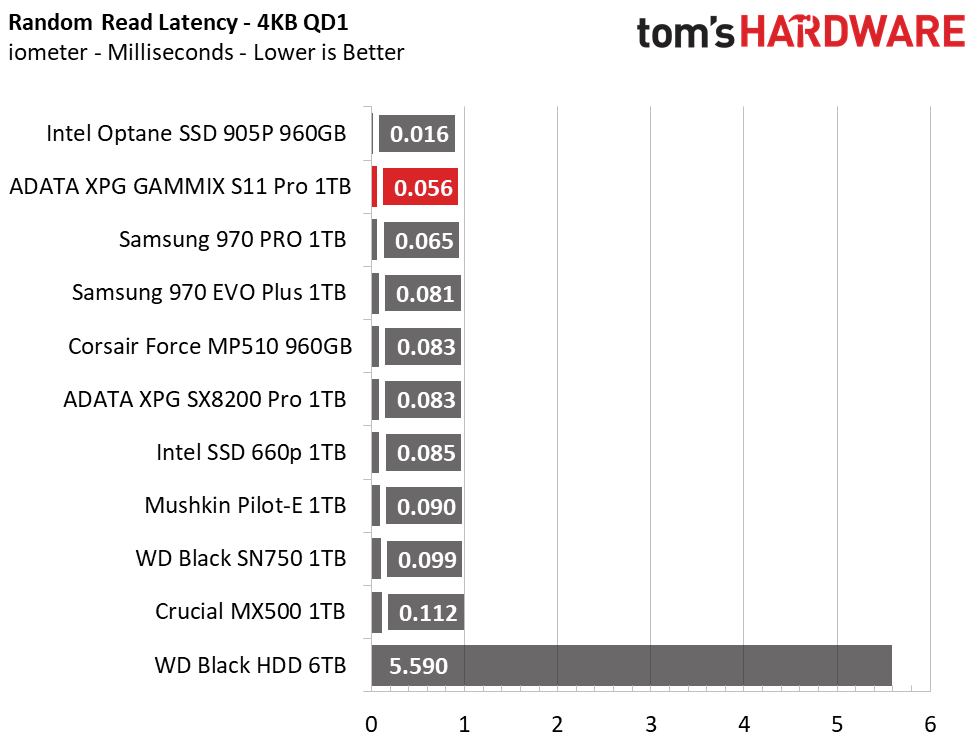
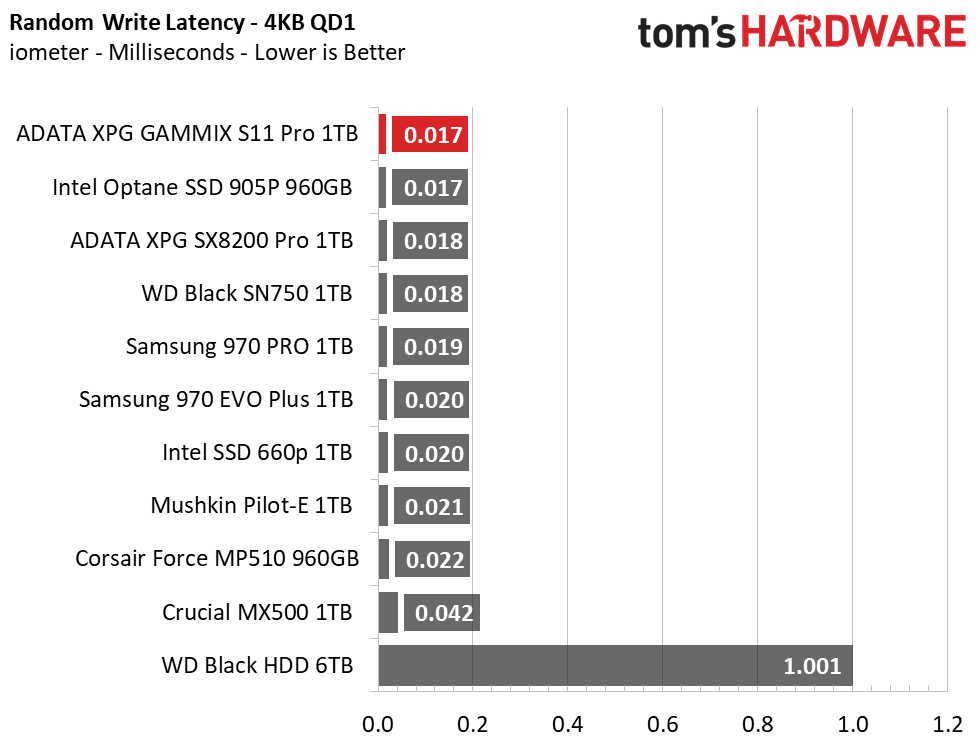
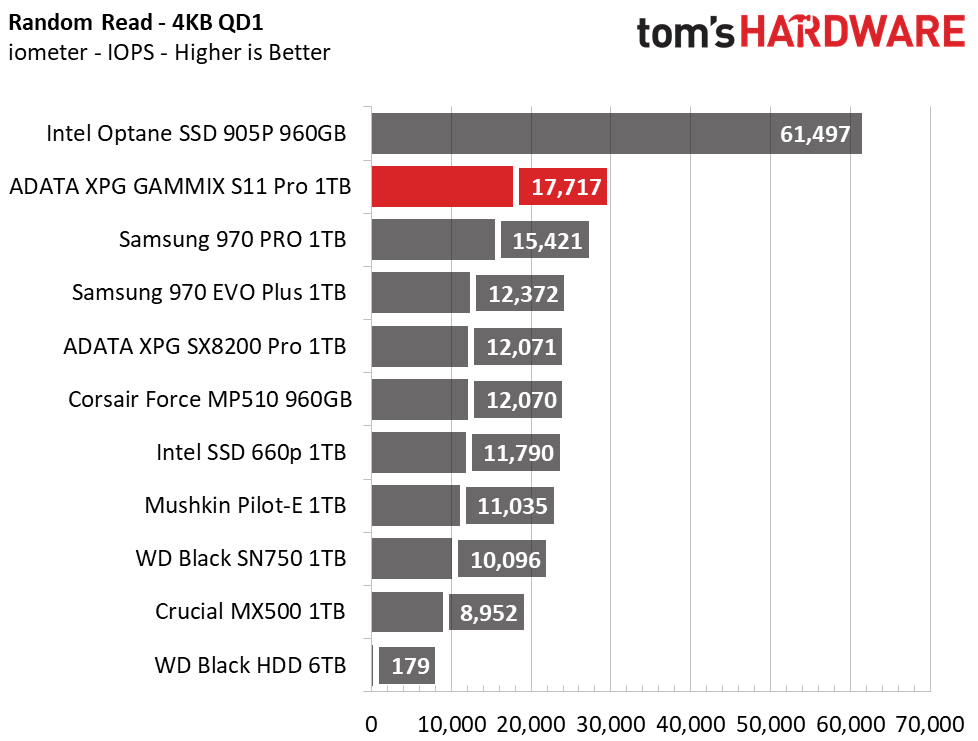
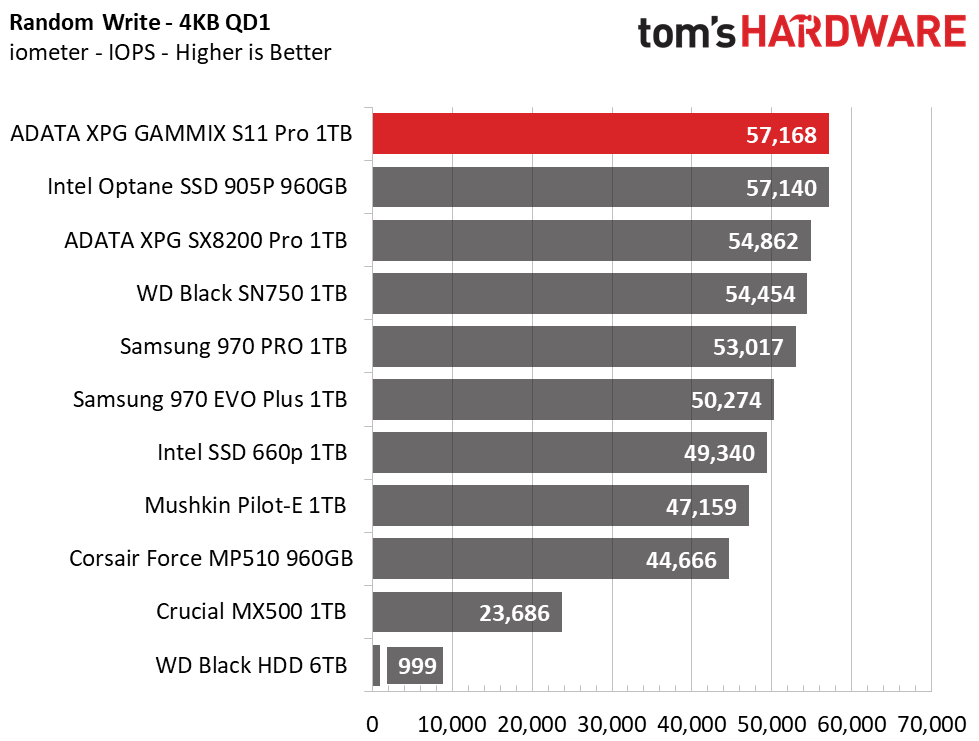
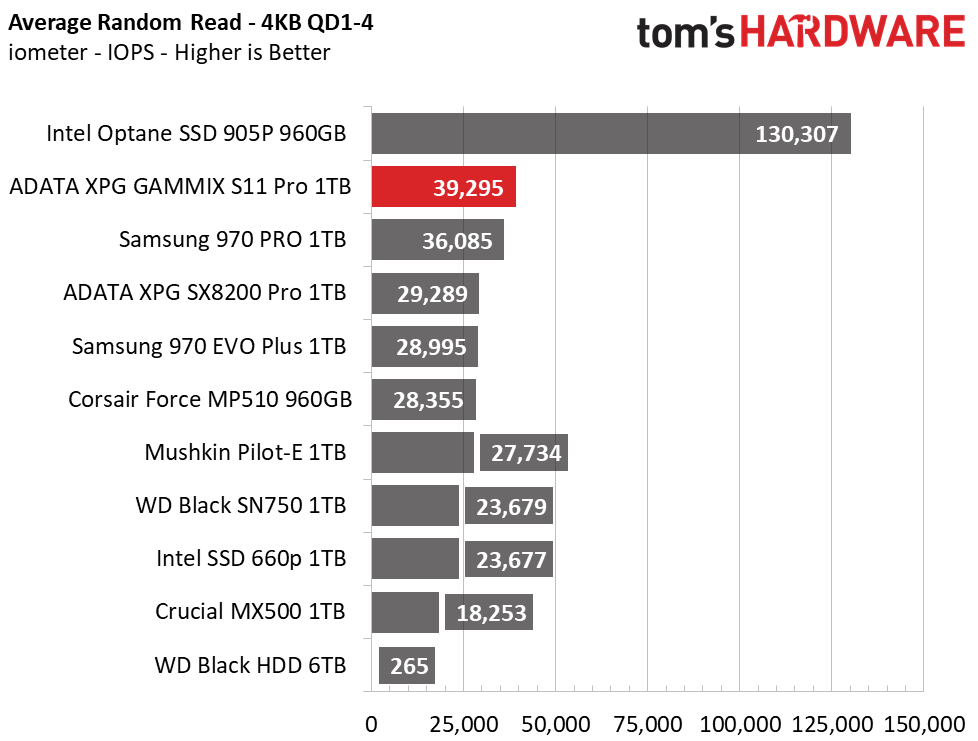
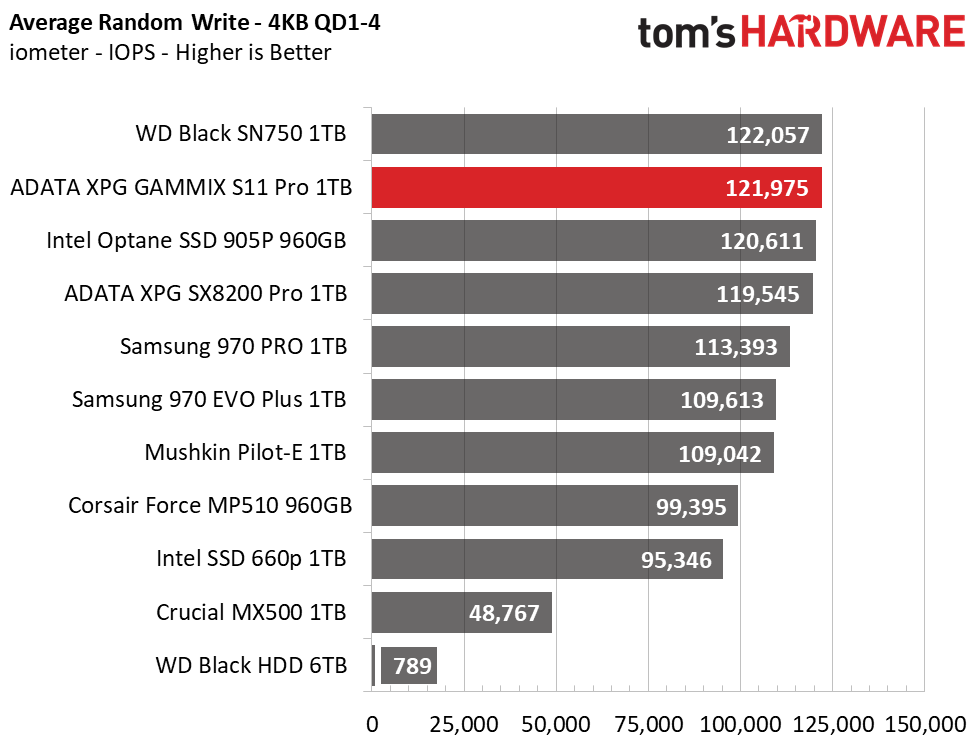
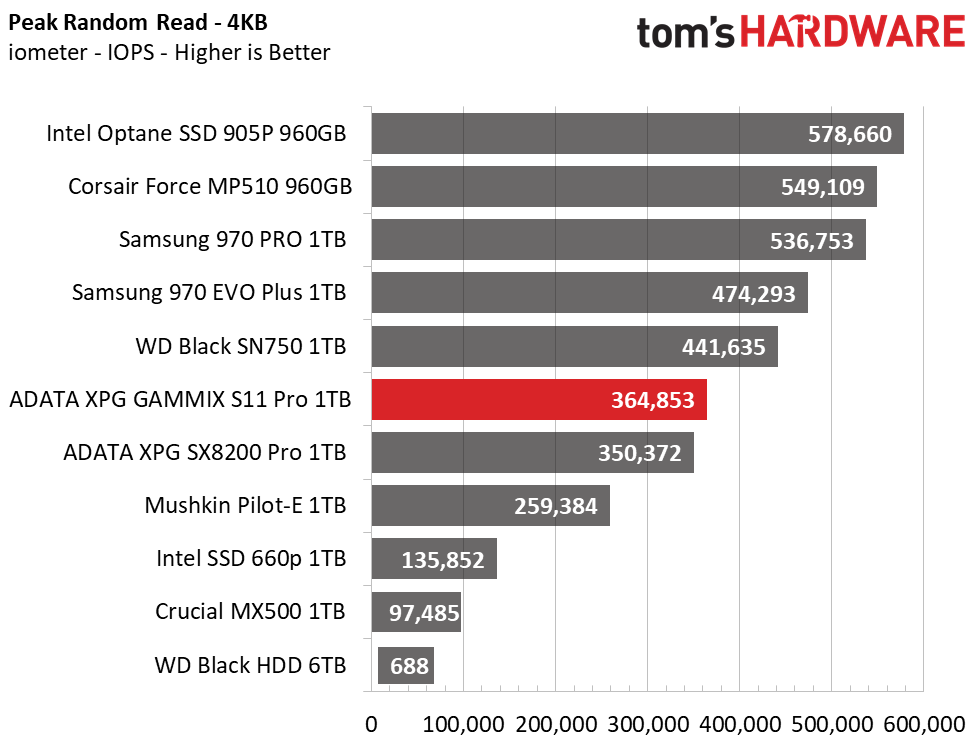
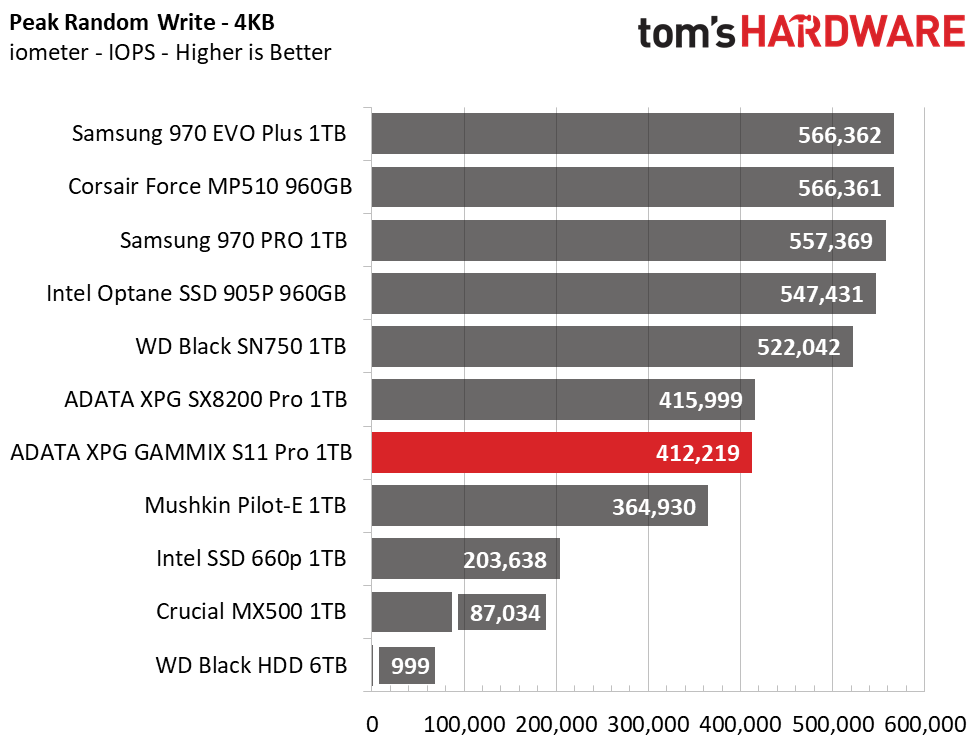
The S11 Pro was able to do a little better in testing with iometer. Read performance peaked at 3.5 GBps, while write remained about the same at 2.9 GBps. At QD1, the S11 Pro shows off some of the fastest response times in the whole group, save for the Intel Optane 905p. Even averaging QD1-4, this drive proves to be one of the fastest consumer SSDs available. And, at a high QD of 128, random performance maxes out at about 365,000 / 412,000 read/write IOPS.
Sustained Sequential Write Performance
Official write specifications are only part of the performance picture. Most SSD makers implement a pseudo-SLC cache buffer, which is a fast area of SLC-programmed flash that absorbs incoming data. Sustained write speeds can suffer tremendously once the workload spills outside of the pSLC cache and into the "native" TLC or QLC flash. We use iometer to hammer the SSD with sequential writes for 15 minutes to measure both the size of the pSLC buffer and performance after the buffer is saturated.
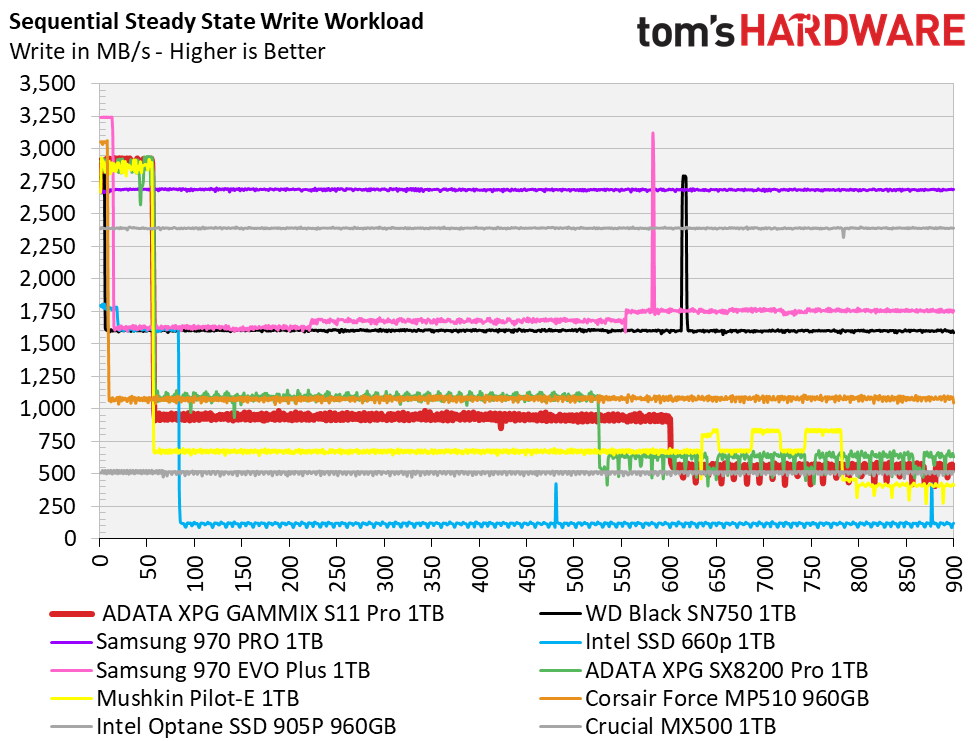
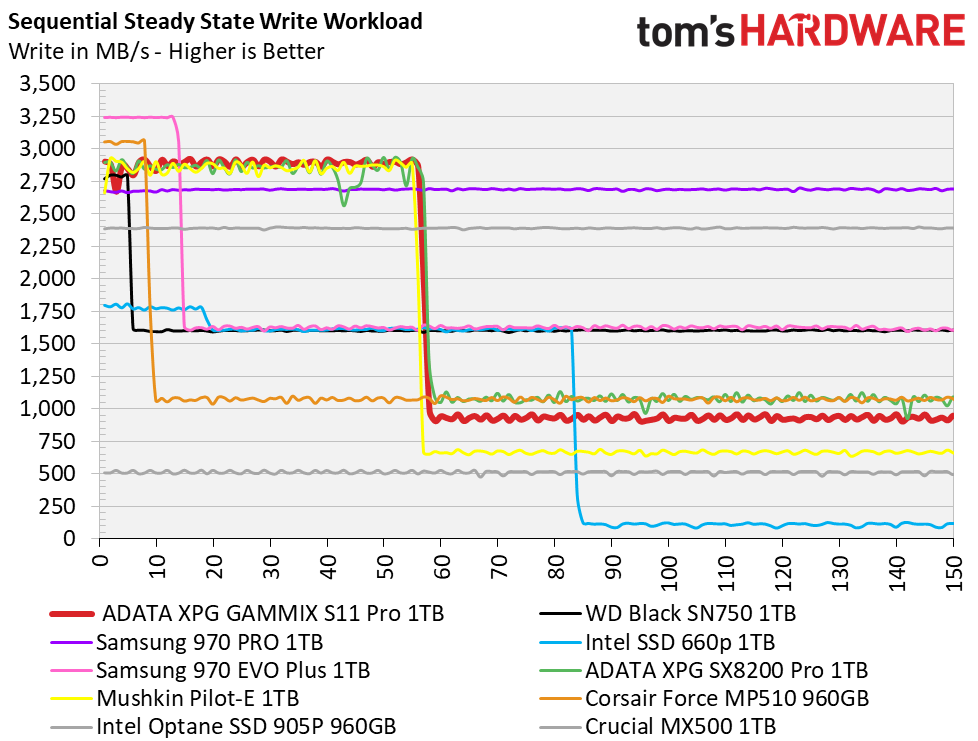
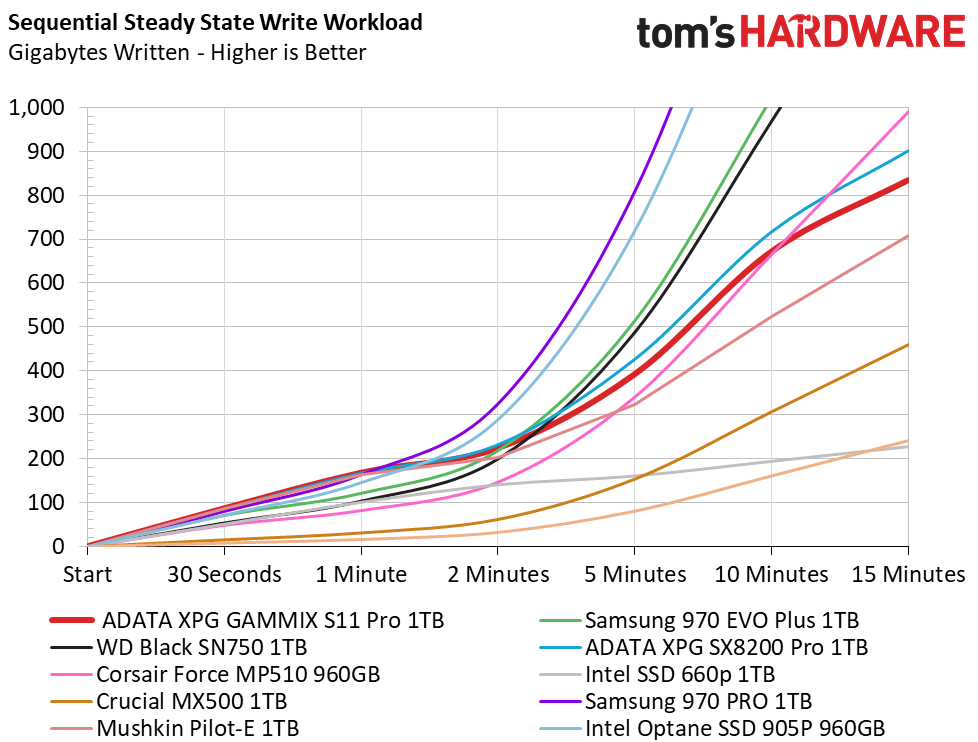
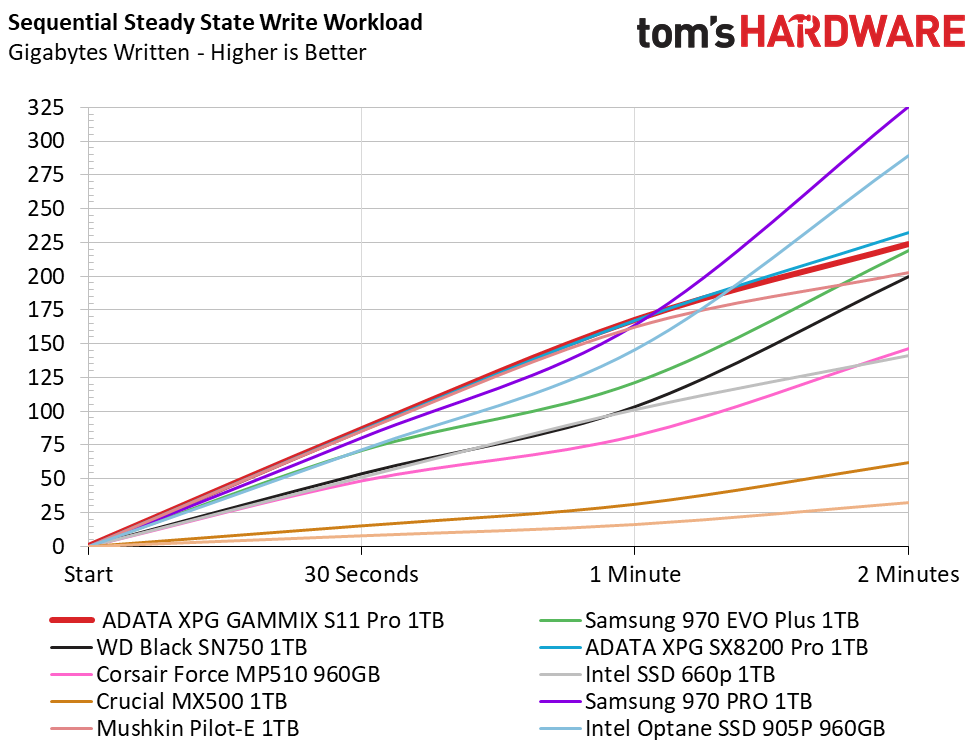
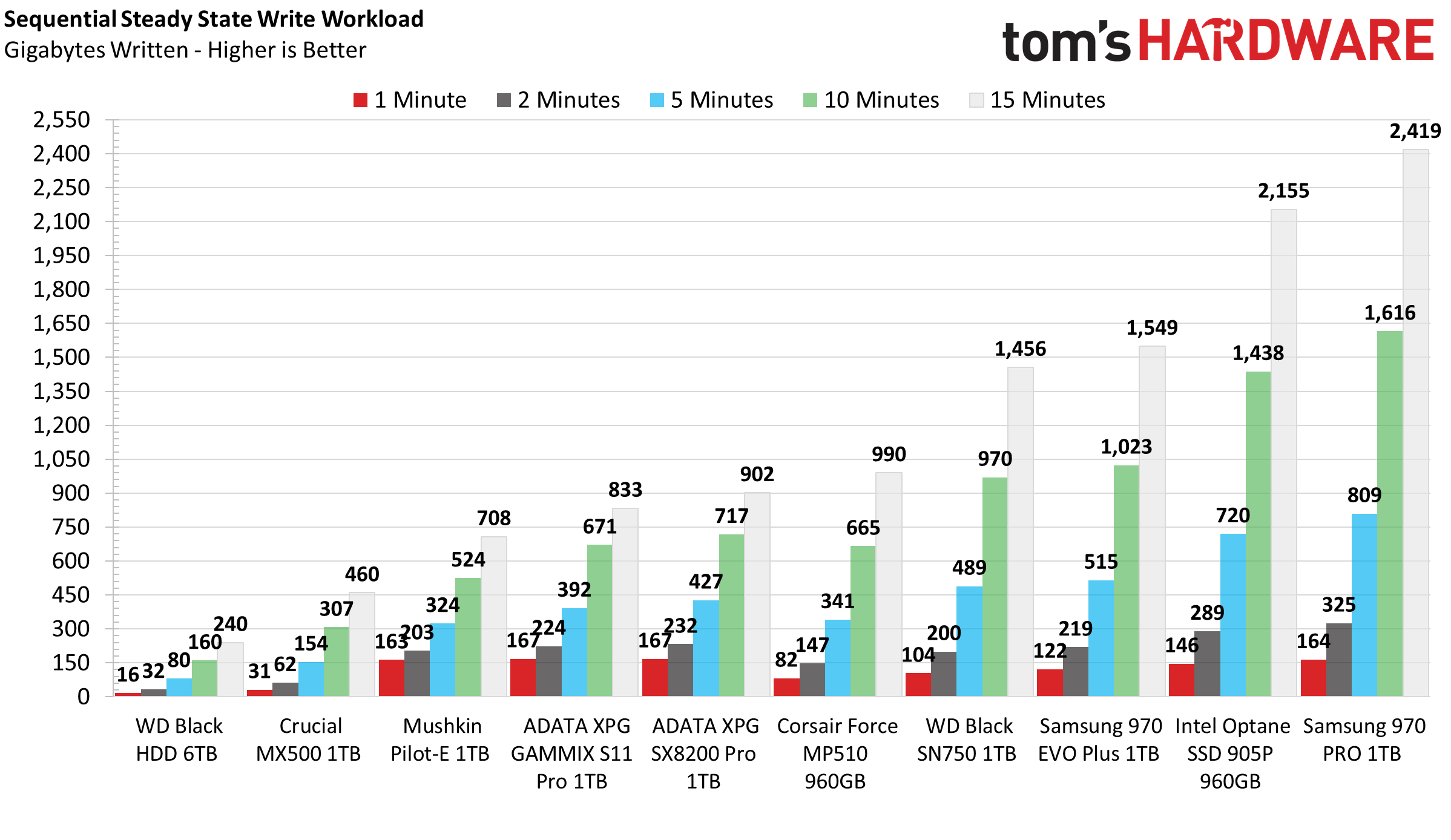
Like Adata’s SX8200 Pro, the S11 Pro has a large write cache, but after extensive writing, performance can degrade significantly and lead to inconsistency. The S11 Pro’s cache was able to sustain writing at 2.9 GBps for a total of 162GB of data before performance degraded to an average of 930 MBps. However, beyond 670GB written, performance degraded once more to an average of 540 MBps.
Power Consumption
We use the Quarch HD Programmable Power Module to gain a deeper understanding of power characteristics. Idle power consumption is a very important aspect to consider, especially if you're looking for a new drive for your laptop. Some SSDs can consume watts of power at idle while better-suited ones sip just milliwatts. Average workload power consumption and max consumption are two other aspects of power consumption, but performance-per-watt is more important. A drive might consume more power during any given workload, but accomplishing a task faster allows the drive to drop into an idle state faster, which ultimately saves power.
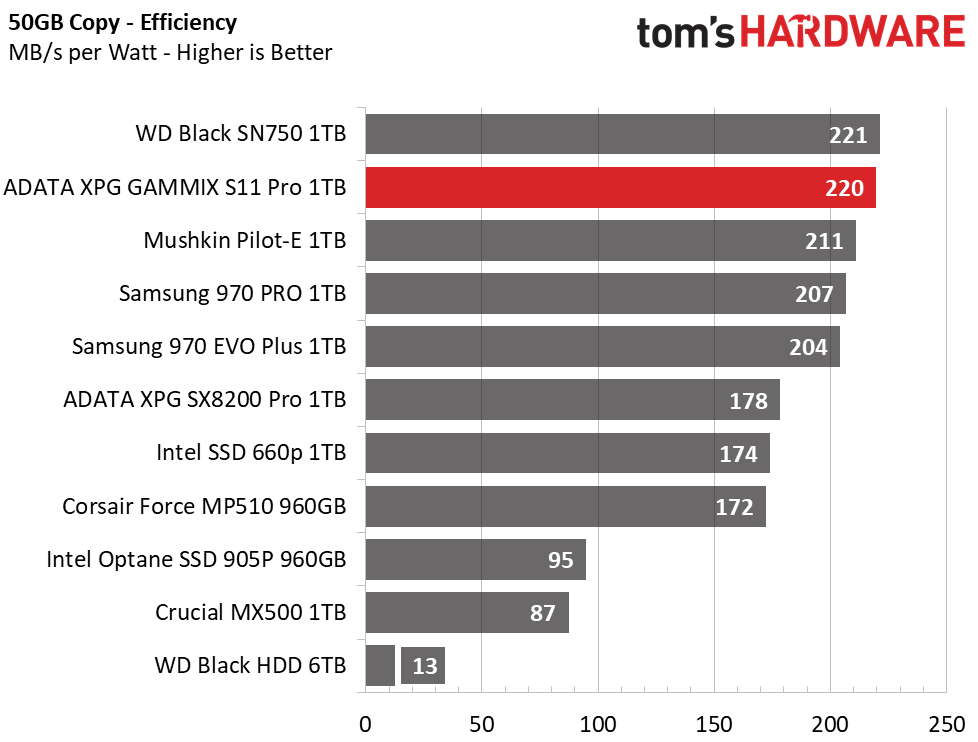
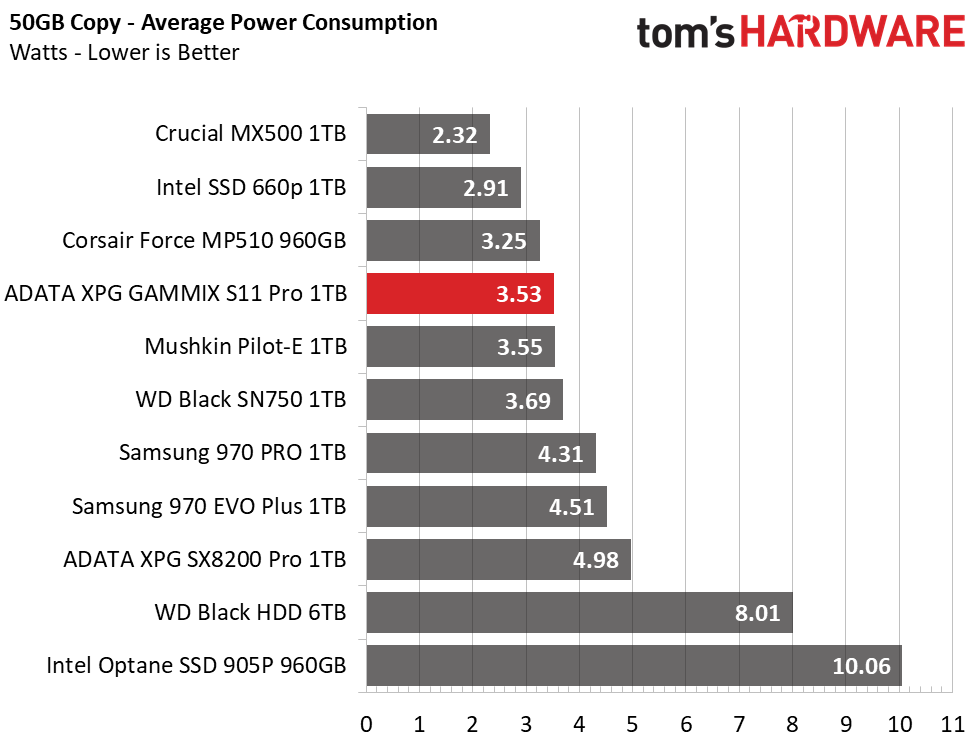
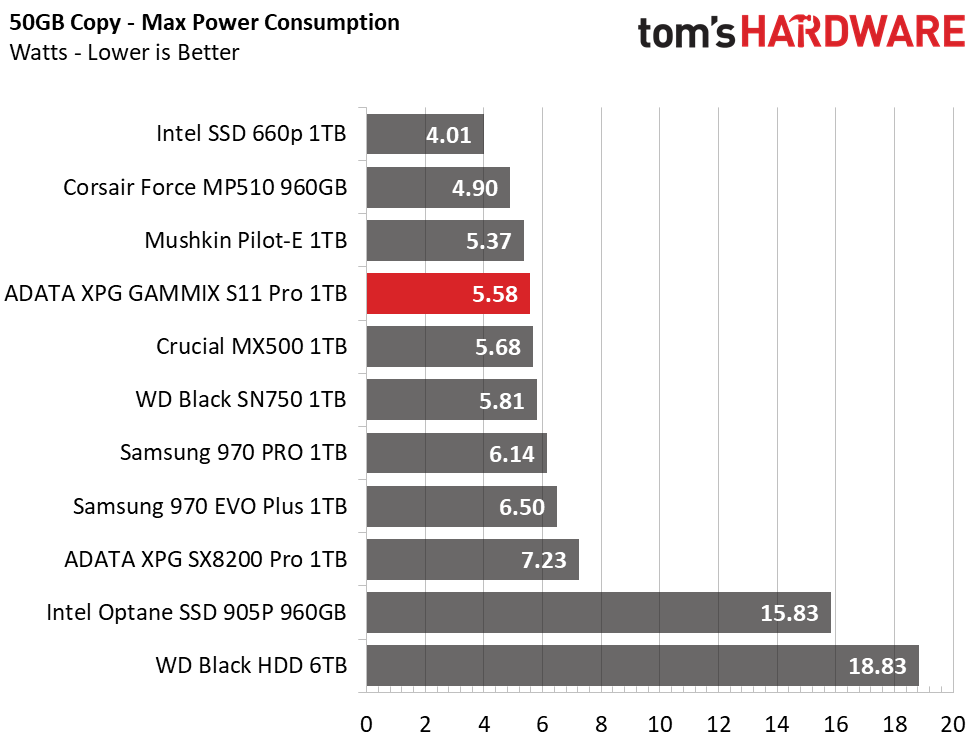
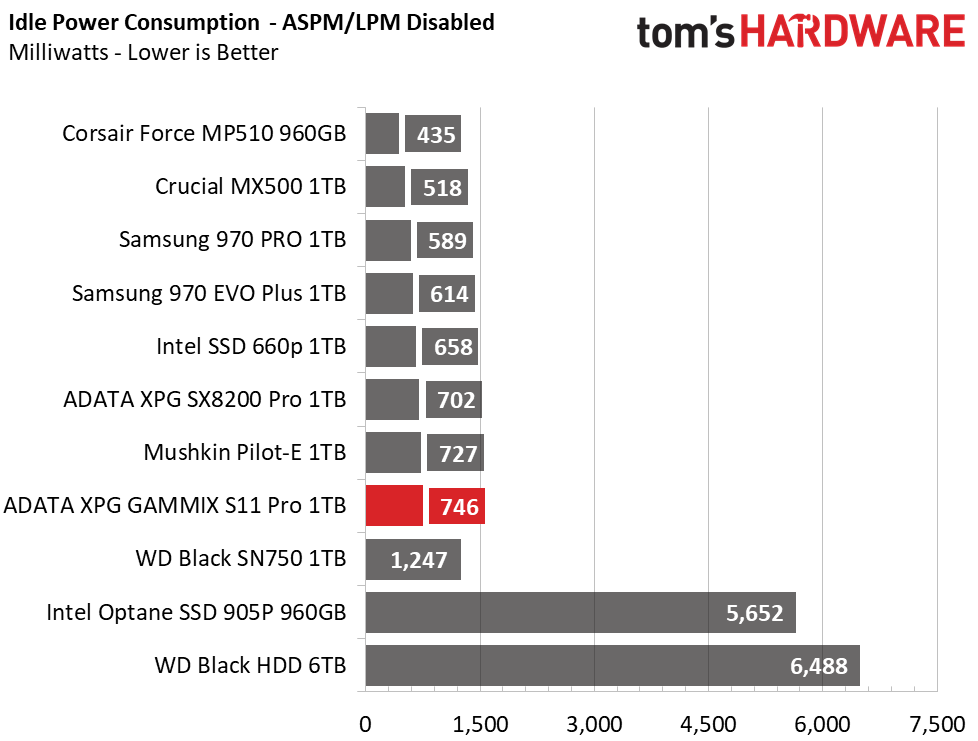
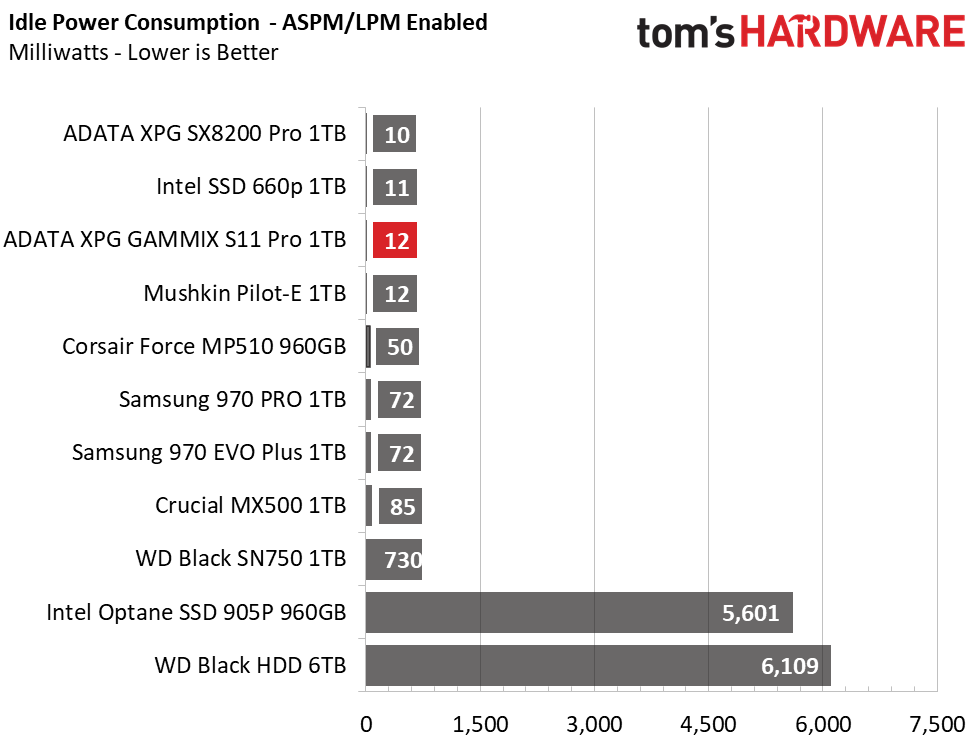
The S11 Pro’s power consumption is a bit more restrained than the SX8200 Pro. This could be the reasoning behind its slightly slower file copy results. Nevertheless, the S11 Pro, consumed a similar amount of power on average as Mushkin’s Pilot-E. With an average of 220 MBps per watt consumed, it lands second place on the efficiency chart here, closely on the heels of WD’s Black SN750. Sipping just 12mW of power at idle with ASPM enabled, it is rather efficient when idling, too.
MORE: Best SSDs
MORE: How We Test HDDs And SSDs
MORE: All SSD Content

Sean is a Contributing Editor at Tom’s Hardware US, covering storage hardware.
-
emayekayee As always, I appreciate the review. But what took so long? I've been using (and loving) this drive since Feburary.Reply -
agentlaidlaw the s11 pro comes in 2tb flavor. i just ordered one off amazon myself... and adata's s11 pro page lists a 2tb model as well.Reply
https://www.xpg.com/en/feature/596/
the 2tb sku is AGAMMIXS11P-2TT-C